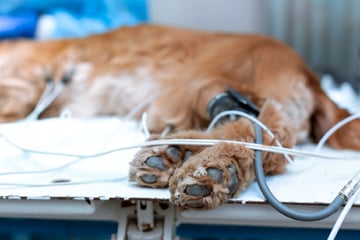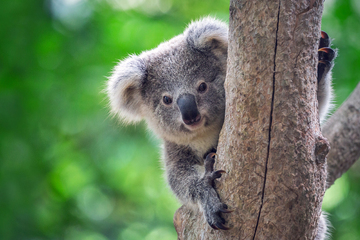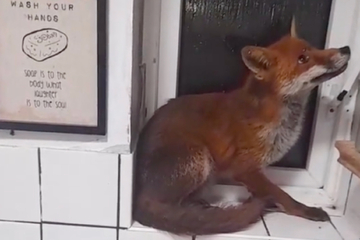Keeping raccoons away: How to get rid of the little rascals
Raccoons may look like they're going to rob you at gunpoint, but they really don't mean any harm. That doesn't mean that they're a welcome guest, though, as they can cause a lot of damage to our houses and the environment. Here are some tips and tricks for keeping them away and driving them out of your home.
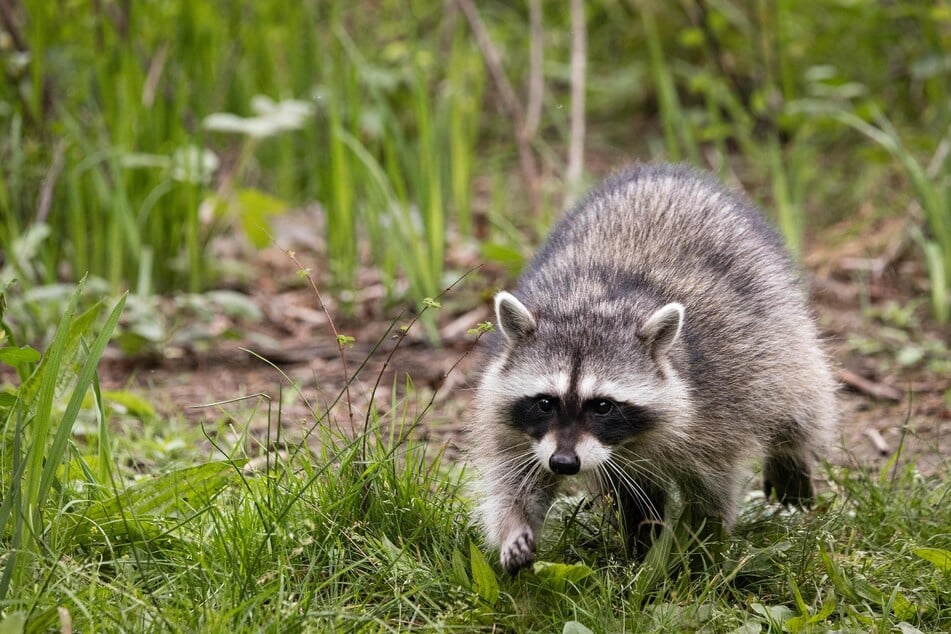
Raccoons may now live all over the world, but they originated in North America. We've historically driven the animals out of their habitats, and now, we have to deal with the fallout.
On the bright side, though, there are many ways to deal with these pesky mask-faced mammals, and we're here to help.
These critters might look kind of cute, but don't be mistaken. They can be nasty little dudes. Raccoons are weirdly aggressive for such small beasts, and can carry deadly diseases like rabies and salmonella.
On top of seeming more aggressive than Uncle Larry after a few drinks, their waste can also contaminate your yard with parasites and diseases.
If raccoons are such troublemakers, what can you do about them? Here's a guide on how to keep raccoons at bay, and what you can do to get them to move on out.
Why are raccoons at my house?
As our cities have grown outwards, swallowing large areas of forests and vegetation, raccoons have been pushed increasingly into urban and suburban areas. The destruction of an animal's natural habitat is usually associated with a decrease in their population, but in the case of raccoons, the opposite is true.
In North America, the raccoon population is increasing. In fact, the common raccoon has a Federal Conservation Status of "Least Concern," according to the IUCN. This means that they are both being pushed into urban areas and there are more of them, making it more and more important than ever that we know how to deal with the little rascals!
Now, there's no denying that raccoons are insanely cute. With their masked faces and their adorably fluffy tails, they're pretty irresistible. Especially for children, which is why they're such a worry. Once a raccoon reaches sexual maturity, it becomes more aggressive and can cause serious injuries, especially to kids who are small and not expecting to be attacked.
Raccoons can make their way into your home, yard, and property to scavenge for things to eat. They are not necessarily scared of humans, so their habits, combined with having been pushed into populated city centers and neighborhoods, can lead to a world of trouble.
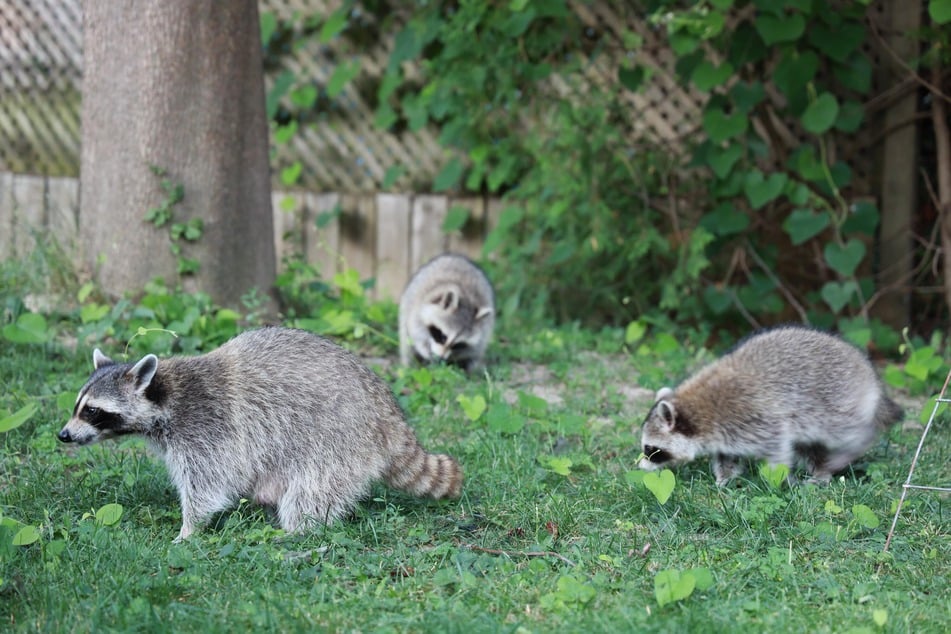
Being attacked by a raccoon is especially dangerous, as they can carry some pretty nasty diseases. On top of that, they can pass on ticks, fleas, and lice to other animals and humans, causing infestations within the household.
When they get into more populated areas, these annoying little devils start cleaning out garbage cans, damaging property, and attacking people and pets. Your garden plants aren't safe, either.
Here are a few things that you can do to get rid of raccoons.
What do raccoons eat?
Raccoons are omnivores, meaning that they will eat both plants and humans – just like us! Except ... they also eat disgusting things that we wouldn't touch, and enjoy scavenging through trash.
When they're in nature, raccoons hunt along bodies of water, using their front paws to scratch the ground looking for crabs, mussels, frogs, and small fish. Have you ever noticed a raccoon that looks like it's washing its hands? It's most likely hunting, not cleaning itself.
Raccoons will also eat birds, salamanders, lizards, mice, fruit, eggs, and nuts. The problem, though, is that in neighborhoods and cities, they often struggle to find these foods naturally. As a result they will eat fallen fruit, food scraps, garbage, compost, small animals and pets, and more.
As raccoons are attracted to the smell of meat, fish, overripe fruit, dairy products and bread, you need to be careful what you leave out if these critters are in your neighborhood. Be especially careful if you own chickens, as they can eat both the chicken and the egg.
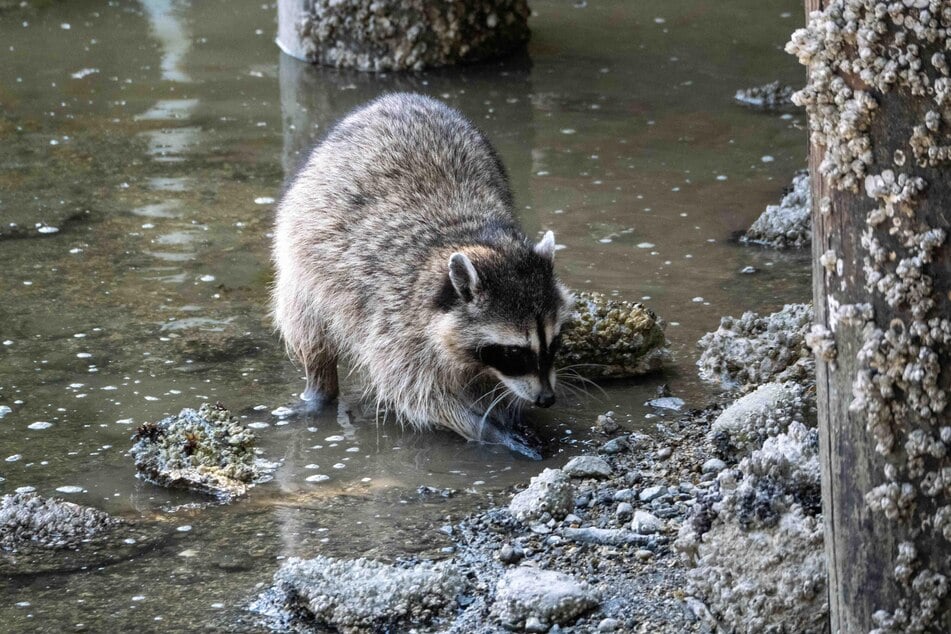
How to recognize the presence of raccoons
Raccoons are pretty serious pests, and an infestation shouldn't be taken lightly. There are a few ways to notice a raccoon problem, even if you haven't seen any of the little fellows yourself.
Here are a few things to look out for:
- Noises in your attic or basement
- Emptied trash cans or compost
- Destroyed trash bags
- Ransacked flower beds
- Scattered food remains
- Smell of feces, urine, and rotten food
- Holes in the walls of the house
- Missing roof tiles
- Injured or killed birds and pets
- Damaged bird nests and houses
- Paw prints similar to a small human hand
These may all seem like similar symptoms to those of a horror film. Raccoons are nocturnal and will come out at night, similar to possums, so you may start waking up to all sorts of trouble if they're around. While raccoons themselves don't smell too bad, if they're living nearby, they will also go to the bathroom nearby. The waste can really start to stink, and is another tell-tale sign you've got raccoons nearby.
How to keep raccoons away from your house
It can be a real pain if a raccoon moves into your house uninvited. And it's not just because of the infestation itself, but also because of how incredibly difficult it is to get rid of them once they are there.
As a result, it is advisable to take preventative actions to keep raccoons away and avoid the situation in the first place.
How to keep raccoons away: Preventative measures
There are many steps that can be taken to reduce the risk of a raccoon infestation. These measures might seem basic, but many homeowners don't do them, as they can be a bit of hassle. Yet, it's better to avoid a raccoon infestation than to avoid a little extra work at the expense of you and your family's safety.
Here are a few preventative measures that will help keep raccoons away:
- Do not place garbage bags in front of your house overnight.
- Lock all garbage cans and compost boxes.
- Remove all climbing aids near garbage cans and compost bins.
- Do not leave food scraps, fallen fruit, or nuts lying around.
- Only feed pets indoors.
- Prune trees that are close to the house.
- Install climbing protection for rain gutters, wooden columns, and tree trunks.
- Put smooth boards on house corners and facades.
- Install an electric fence on the gutter or around the garden.
- Fix a metal grate to the chimney.
- Install sound devices and motion detectors with flashing lights.
- Close holes, gaps, or other possible access points to the roof.
- Close and lock the cat flap / door at night.
- Build a fence around chicken and rabbit hutches.
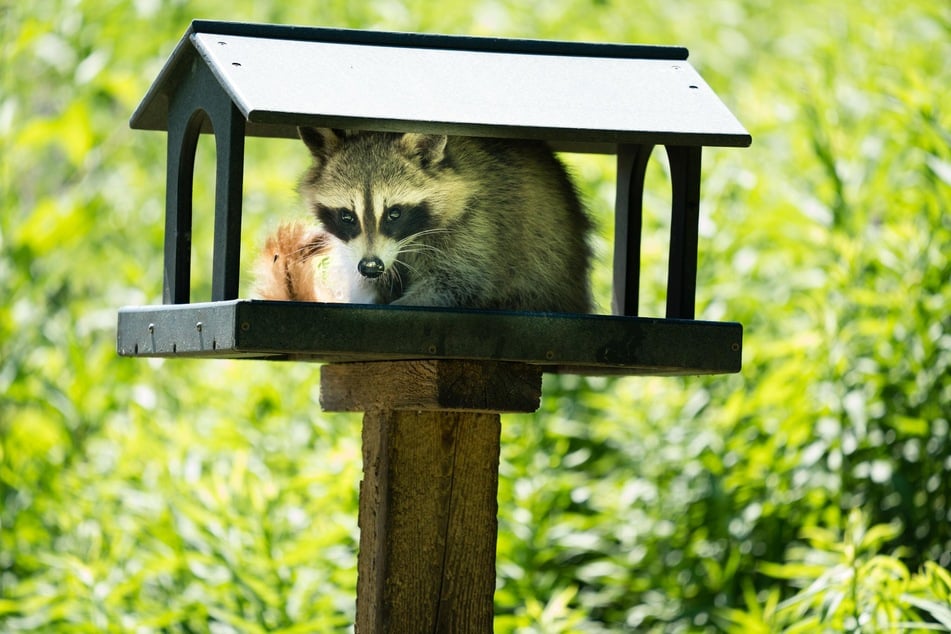
How to keep raccoons away naturally
There are a variety of do-it-yourself raccoon repellents that will naturally keep raccoons from taking up residence in your humble abode.
Here's a list of things to try out:
- Get rid of all that vegetation: Raccoons like to forage. As a result, if you get rid of unneeded foliage, they will be less likely to come nearby.
- Don't forget the cucumber: Fun fact: raccoons absolutely despise the little green logs! So plant them along the fence or in your garden as a deterrent.
- Vinegar: Soak some wooden posts or markers in vinegar, or maybe even ammonia, and plop them around the yard in different places.
- No drink for you: Cover your water sources so that raccoons can't try to drink or hunt in your pond or pool.
- Pet food is for pets: Feed your pets inside.
Keep raccoons away: Tips and tricks
Have you kept your trees pruned and your climbing protection maintained? Have you even installed climbing protection? Make sure that all trees and hedges are kept at least three feet from your house when pruning, to help keep the little buggers away.
Make sure to install metal sleeves, at least 25 inches long and high, around the edge of your house to stop raccoons from climbing up the side. Use various traps to catch these masked mammals alive so that they can be given to the relevant authorities.
Depending on where you live in the US, you'll need to undergo a different set of steps to deal with a captured raccoon. Your best bet is to contact the Wildlife Department of your state or region, and go from there.
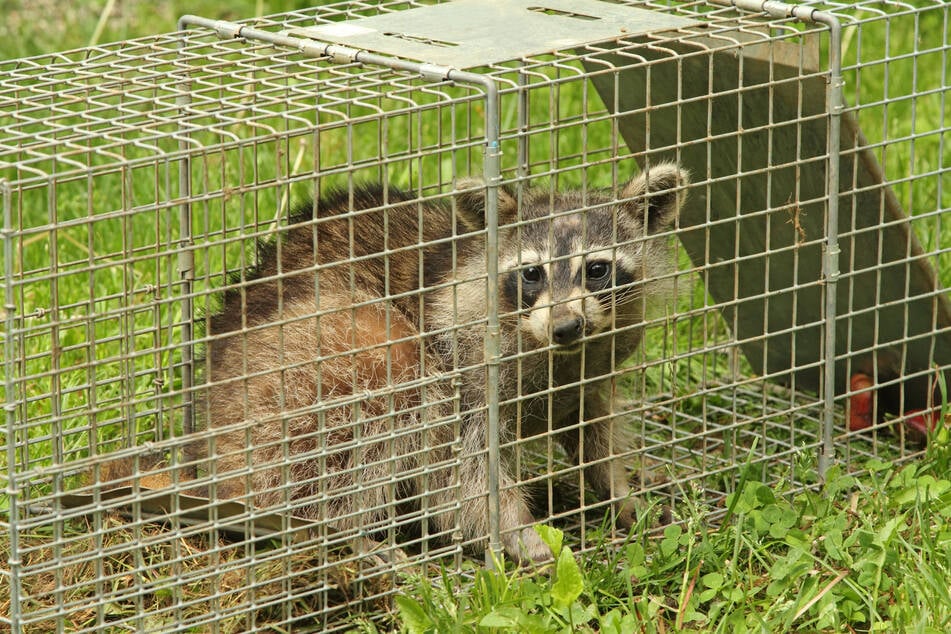
How to get rid of raccoons
There are a variety of different ways by which you can get rid of a raccoon infestation and remove these nasty little creatures from your yard, roof, or garage. Yes, they may look adorable, but you will definitely want to take these steps if you get overrun.
There are a huge variety of home remedies to try out, but the most effective way to get rid of raccoons is professionally. Like any pest - rats, bunnies, cockroaches, etc. - the most fool-proof approach to getting the problem solved is, of course, getting pest control to come and help.
It might be expensive, but if you call and hire a proper pest inspector to come and remove these fluffy fellows, you will safely get rid of raccoons with ease.
Get rid of raccoons: Home remedies
Raccoons may think that they are bada**es, they may think that they are ripe and ready to rob a bank, but in reality, they are scared of loud noises and bad smells. They're also pretty shy and sensitive, characteristics that are easy to exploit at home.
Here are some household remedies to get rid of raccoons:
- Evening walks with a flashlight through your house and garden.
- Installing ultrasonic devices in your house.
- Making loud noises, such as playing loud music, in the attic.
- Attaching motion detectors with strobe lights, alarm sounds, or water sprays.
- Running garden sprinklers at night – if you're not wasting water
- Placing metal chimes, or bells on a string, in front of entrances and in the attic.
- Spreading the scent of chili, lavender, cayenne pepper, mothballs, and chemical smells such as toilet stone.
To Note: Home remedies like ultrasound are excellent, but will only work indoors. This is because they have a short range in the open air, and a raccoon will simply avoid them.
How to scare off raccoons from your yard
It can be pretty scary if a raccoon gets a bit aggressive, or even if it's just wandering around near you or your family. Luckily, it's relatively easy to scare them away in these situations. They are usually timid and scared of humans, so try not to worry too much.
Here are a few ways to scare off a raccoon:
- Make loud noises, stomp on the ground, and make yourself look big by standing up straight with your shoulders broad.
- Spray the raccoon with garlic juice or cayenne pepper mixed with water.
- Clap and yell at the raccoon, as they don't like loud noises. Try playing some rock 'n roll!
- Spray them with the garden hose.
Keep in mind: If you get attacked by a raccoon and scratched or bitten, you must immediately go to the hospital and be checked for common diseases like rabies. You can get very sick from a raccoon bite, so be extremely cautious.
TLDR: Final tips for dealing with raccoons
Raccoons can be a real pain in the butt for anyone who doesn't like little critters or contracting nasty diseases. As pesky as these little monsters are, not all is lost if you get an infestation.
Top tips to remember:
- Raccoons are dangerous omnivores that carry nasty diseases and may attack your pets.
- Raccoons can cause all sorts of trouble, such as bad smells, property damage, disappearing trash, and hurt pets.
- Raccoons can be dissuaded from hanging at your home through a variety of basic lifestyle changes and securing your yard and trash.
- Raccoons can be removed via both homemade remedies and by contacting pest control professionals.
Raccoons are coming further and further into residential areas now that humans are spreading out into their turf. House owners should take appropriate precautions early on to keep these furry lodgers away.
Cover photo: Unsplash / Pete Nuij

